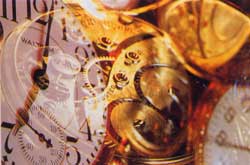 Wonder, if you will, the importance of time. Not the magazine, which at its best is a prop for not showing fear on airplanes. No, I want to think this week about the time that governs when we sleep, work, travel and live our lives.
Wonder, if you will, the importance of time. Not the magazine, which at its best is a prop for not showing fear on airplanes. No, I want to think this week about the time that governs when we sleep, work, travel and live our lives. We can't control its passage. At best, we can try to manage time. But, contrary to what quite a few foreign residents of this capital city may believe, we can't stop time. It rolls on, even when you're wearing sandals and a dashiki. One of the most effective techniques of managing time came to us from a Canadian named Sanford Fleming. A railway engineer by profession, Fleming got to thinking about the passage of time when he missed a train in 1878.
Less than 10 years later, the entire world had adopted his notion of Universal Standard Time, based on the British imperial notion that the world was centered on London.
It was a simple enough idea. A single system of time for the entire planet that began in the village of Greenwich and marched away east and west in one hour intervals, encircling the globe and ensuring that everyone got to do their daily activities in-well-daylight.
This was an especially important concept in a place like North America. Canada and the United States are wide countries and thanks to Sanford Fleming's idea, New Yorkers and Los Angelinos, along with Canadian fishermen on both coasts, work in the daytime, not at night.
Alas for the people of China and India, it appears that Fleming is considered a dangerous radical there. Both of Asia's behemoths are also wide countries, China is almost as wide as the United States. India's extremities-from the Rann of Kutch to the mountain jungles of Arunachal Pradesh-are as far apart as, say, Los Angeles and Atlanta. That's four time zones in America. As for Russia, the land of Rasputin sneers at North America's puny time zone count. You have to reset your watch 11 times as you fly from Vladivostok to the border of Byelorussia.
But India? China? Nope, just the one time zone for us thanks. So if you're in Beijing or Delhi, all is well. You get up at dawn, go to the fields or the office when the sun is warming the sky and head home at dusk. No problem. But how about the people of Urumchi in distant Xinjiang province? They awake and start their day's labor when there are still five hours of darkness left. And they take their first drink of fermented mares' milk at high noon, figuratively speaking. The same disconnects plague people in Dibrugah, Assam or Bhuj, Gujarat minus the mares' milk.
Simply put, some pinhead in the recent history of both countries has decided that 'National Unity' matters more than the convenience and safety of citizens so the entire country will follow the capital's schedule.
Ironic, methinks, that the British Empire found ways to accommodate both the imperial center and the fringes of its far flung possessions but modern, ostensibly anti-colonial nation states can't.
This idea of time zone nationalism spills over into Nepal as well. In the scheme of things, we could be two different times if we followed international norms. The country is wide enough. And that pesky 45 minutes that has to be added to any time given in almost every other part of the world. Confusing to the innumerate, present company included.
Given that standardised time is a Canadian invention, I am honor bound to urge India, China, Nepal, and all other holdouts from the march of Flemingesque progress, to reconsider their stance on the question of time. If only so we can get in a few extra pegs at the end of a long day. Mares' milk anyone?



